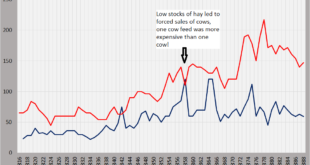From my Substack Newsletter Share this:Like this:Like Loading...
Read More »The limitarian implications of utilitarianism
My fellow Crooked Timber blogger Ingrid Robeyns has long been making the case for limitarianism, that is, the idea that there should be an upper limit on the amount any one person can own or consume. As Ingrid has observed, limitarianism is a constraint, rather than a complete ethical principle, so it’s important to consider how it interacts with other principles. In the case of utilitarianism, the answer is surprisingly well, at least in (using Ingrid’s terminology) this and nearby...
Read More »Summary of the Great Transformation by Polanyi
from Asad Zaman and current issue of WEA Commentaries Ever since the spectacular failure of modern economic theory became obvious to all in the Global Financial Crisis, the search for alternative ways of organizing our economic affairs has intensified. The vast majority of alternatives under consideration offer minor tweaks and patches, remaining within the methodological framework of neoclassical economics. In contrast, Polanyi offers a radical alternative, with unique insights based on...
Read More »Something about prices (III). ‘Commons prices’ which are prices fostering the reaping of the Blessing of the Commons.
As nobody else bothers, I’m tinkering with designing a (badly needed) periodic table of prices. Look here and here. Economists are fond of ex post market prices – i.e. prices paid for actual transactions. But other kinds of prices abound. Administered prices, shadow prices, cost prices and more. Each of these prices are important and are used to influence the production and distribution of goods and services. Each of these are, separately, defined on all kind of webpages. but an...
Read More »A brief review of ECON 101 textbook options
from Junaid Jahangir and RWER issue 104 In terms of reviewing textbooks to teach economic inequality, three options are considered. First, the Mankiw, Kneebone, and McKenzie (2020) textbook, as I used it to teach microeconomics at the ECON 101 level. Second, the Ragan (2020) textbook, as it seems to be a bridge between neoclassical economics and perspectives found in options like the CORE text. Finally, the CORE textbook, which introduced a new module on teaching economic inequality in...
Read More »‘Testing’ purchasing power parity theory
from Lars Syll Purchasing power parity doctrine is examined by sophisticated statistical and econometric techniques. The time series of aggregated price levels and the nominal exchange rates are treated as a random sample. Most papers of this type deal with the technical properties of the slightly different data sets. To take some examples (at random): “Two potential problems arise when working with nominal exchange rates and ratios of price levels. First, unit roots are possibly present...
Read More »Yet again, my comprehensive Middle East strategy for the US
In view of the apparent end of what passed for democracy in Israel, it’s time for me to repost my comprehensive proposal for US policy covering all aspects of relationships between the US and the Middle East. It’s over the fold. Share this:Like this:Like Loading...
Read More »War in Ukraine and global finance
from Marcello Spanò and RWER issue 104 Let us now turn to the signals of changes that are emerging with the war in Ukraine. The field of analysis regarding the relation of the war with the breakdown of unipolarism and its transformation into a multipolar world is certainly vast and complex. Here we limit the analysis some relevant aspects connected to the centrality of the dollar in the international monetary system. If we examine the 25-year period prior to 2014, we can...
Read More »How dangerous is the European far-right ?
As is usual with trends of all kinds, some recent electoral successes for far-right parties in Europe have been extrapolated into a narrative in which the rise of the far-right is just about unstoppable. That narrative took a blow with the recent Spanish elections in which the far-right Vox party performed poorly and its coalition with the traditional conservative Popular Party failed to secure a majority. Possibly as a result, the leader of the German CDU backed away from a...
Read More »Disaster and denial
I was looking at this picture of people (mostly tourists, it appears) fleeing massive fires in Rhodes, feeling despair about the future of the world when I was struck by an even more despairing thought.Almost certainly, a lot of the people in the picture are climate denialists. And even more certainly, they will mostly remain so despite this experience. Australia was one of the first countries to experience massive fires clearly attributable to global heating. In December...
Read More » Heterodox
Heterodox


